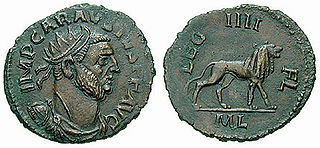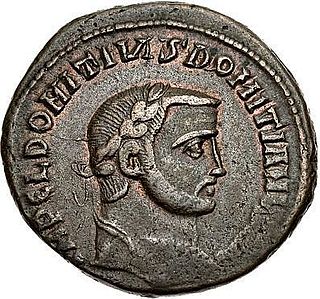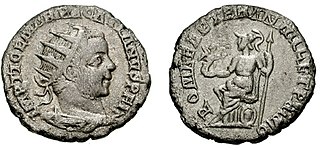 W
WAllectus was a Roman-Britannic usurper-emperor in Britain and northern Gaul from 293 to 296.
 W
WBonosus was a late 3rd-century Roman usurper. He was born in Hispania to a British father and Gallic mother. His father—a rhetorician and "teacher of letters"—died when Bonosus was still young but the boy's mother gave him a decent education. He had a distinguished military career with an excellent service record. He rose successively through the ranks and tribuneships but, while he was stationed in charge of the Rhenish fleet c. 280, the Germans managed to set it on fire. Fearful of the consequences, he proclaimed himself Roman emperor at Colonia Agrippina (Cologne) jointly with Proculus. After a protracted struggle, he was defeated by Marcus Aurelius Probus and hanged himself rather than face capture.
 W
WMarcus Aurelius Mausaeus Carausius was a military commander of the Roman Empire in the 3rd century. He was a Menapian from Belgic Gaul, who usurped power in 286, during the Carausian Revolt, declaring himself emperor in Britain and northern Gaul. He did this only 13 years after the Gallic Empire of the Batavian Postumus was ended in 273. He held power for seven years, fashioning the name "Emperor of the North" for himself, before being assassinated by his finance minister Allectus.
 W
WLucius Domitius Domitianus or, rarely, Domitian III, was a Roman usurper against Diocletian, who seized power for a short time in Egypt.
 W
WMarcus F. Ru. Jotapianus or Jotapian, also known as Iotapianus or Iotapian, was a usurper in the eastern provinces of the Roman Empire during the reign of Emperor Philip the Arab, around 249. Jotapianus is known from his rare coins and from accounts in Aurelius Victor, Zosimus, and Polemius Silvius (Laterculus).
 W
WMarcus Aurelius Sabinus Julianus was a Roman usurper against Emperor Carinus or Maximian. It is possible that up to four usurpers with a similar name rebelled in a timeframe of a decade, but at least one of them is known by numismatic evidence.
 W
WSextus Julius Saturninus was a Roman usurper against Emperor Probus.
 W
WMaeonius, or Maconius, was a short-lived Roman usurper.
 W
WFulvius Macrianus, also called Macrianus Major, was a Roman usurper. He was one of Valerian's fiscal officers. More precisely, sources refer to him as being in charge of the whole state accounts or, in the language of a later age, as Count of the Treasury and the person in charge of markets and provisions. It seems almost certain that he was an Equestrian. The Historia Augusta claims that he was the foremost of Valerian's military commanders, but that is most likely a gross exaggeration, if not entirely fictitious.
 W
WTitus Fulvius Iunius Macrianus, also known as Macrianus Minor, was a Roman usurper. He was the son of Fulvius Macrianus, also known as Macrianus Major.
 W
WTiberius Claudius Marinus Pacatianus , or Pacatian, was a usurper in the Danube area of the Roman Empire during the time of Philip the Arab.
 W
WMarcus Cassianius Latinius Postumus was a Roman commander of Batavian origin who ruled as Emperor in the West. The Roman army in Gaul threw off its allegiance to Gallienus around the year 260, and Postumus assumed the title and powers of Emperor in the provinces of Gaul, Germania, Britannia and Hispania, thereby founding what scholars have dubbed the Gallic Empire. He ruled for the better part of ten years before he was murdered by his own troops.
 W
WProculus was a Roman usurper, one of the "minor pretenders" according to Historia Augusta, who would have taken the purple against Emperor Probus in 280. This is now disputed.
 W
WTitus Fulvius Junius Quietus was a Roman usurper against Roman Emperor Gallienus.
 W
WSilbannacus was a obscure Roman emperor or usurper during the Crisis of the Third Century. Silbannacus is not mentioned in any contemporary documents and his existence was forgotten until the 20th century, when two coins bearing his name were discovered, the first in the 1930s and the second in the 1980s. His unusual name suggests that he might have been of Gallic, or alternatively northern Italian, descent.
 W
WSponsianus is believed to have been a Roman usurper, who attempted to seize the throne during the 240s, likely during the rule of Philip the Arab. The sole evidence for his existence is a single aureus of dubious quality.
 W
WUranius is the name of two possible Roman usurpers of the third century.